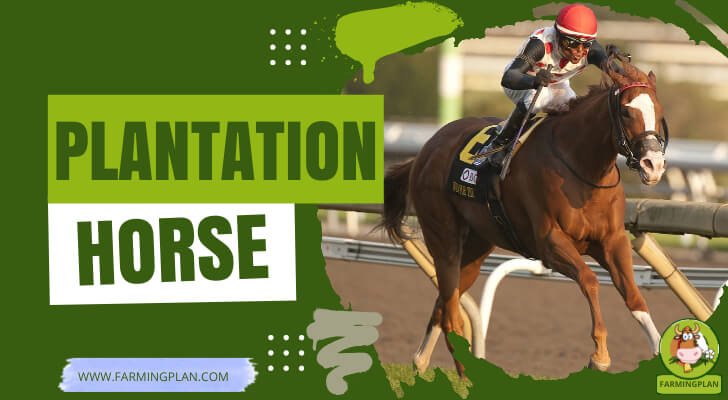Plantation horses are a symbol of Southern equestrian culture, known for their smooth gaits and friendly nature. Originally bred for plantation work, they are now popular for recreational and trail riding. This article explores their rich history, unique traits, benefits, and care tips. Whether you’re a beginner or experienced rider, plantation horses offer a smooth, reliable ride. Let’s dive in!

History and Origins of Plantation Horses
This horses’ origins date back to the early days of the United States. They were initially bred on Southern plantations, where large estates needed reliable horses to handle the long-distance rides that were part of plantation life. These horses needed to be strong, adaptable, and handle harsh working conditions. Many plantation horses are descendants of Spanish horses brought to the Americas during the colonial era. Over time, these horses were crossed with local breeds, creating the smooth-gaited horses we know today.
The need for comfortable and efficient horses was essential, as plantation owners often had to travel long distances to oversee their crops or visit neighboring estates. The horses’ ability to carry heavy loads and provide smooth, comfortable rides over rugged paths made them indispensable. Over the years, the popularity of plantation horses spread, and they became a staple of Southern equestrian traditions. Today, many breeds associated with plantation horses, like the Tennessee Walking Horse and the Missouri Fox Trotter, are still well-regarded for their smooth gaits and friendly personalities.
Characteristics of Plantation Horses
This horses are known for their unique and smooth gaits. Unlike other horses that trot or canter, this horses are bred to have specific gaits that make long rides easier on the rider. Their most notable characteristic is their ability to perform a running walk or fox trot, which allows for a smooth and comfortable ride even over rough terrain. These gaits result from their unique genetic makeup and have been passed down through generations. In addition to their smooth gaits, this horses are also known for their calm and friendly temperament.
These horses are often described as gentle giants, as they are patient and easy to train. They tend to be highly intelligent and responsive to their riders, making them an excellent choice for riders of all skill levels. Whether you’re an experienced equestrian or a beginner, plantation horses are a great match due to their laid-back and approachable nature. These horses come in various colors, from black and chestnut to bay and gray, and they typically have sturdy, muscular builds. While not as large as draft horses, they are strong enough to handle the work they were bred for. Their smooth, flowing gaits and gentle personalities make them incredibly versatile and suitable for many types of riding.
Read More: Icelandic Horse: Why This Stunning Breed Might Surprise You
Popular Gaited Horse Breeds Used as Plantation Horses
Several breeds of gaited horses are commonly used as this horses. These breeds are known for their smooth, comfortable gaits and are often associated with Southern equestrian traditions. Some of the most popular gaited horse breeds used as plantation horses include:
- Tennessee Walking Horse: Known for its signature running walk, it is one of the most popular this horse breeds. These horses are widely used for trail riding, as their smooth gait makes long-distance rides much more comfortable. They are also known for their calm temperament and versatility in various riding disciplines.
- Missouri Fox Trotter: This breed is known for its smooth fox trot gait, which provides a comfortable ride over various terrains. Missouri Fox Trotters are also known for their stamina, intelligence, and ability to adapt to different riding environments, making them ideal for recreational and professional riders.
- Paso Fino: The Paso Fino is another smooth-gaited breed originating in the Americas. These horses are known for their four-beat lateral gait, which provides a smooth ride. Paso Finos are tiny, compact horses with a gentle disposition often used for trail and pleasure riding.
- Peruvian Paso: Similar to the Paso Fino, the Peruvian Paso is a breed known for its smooth, four-beat gait. These horses have been bred for comfort and endurance, ideal for long rides on rough terrain. The Peruvian Paso is also known for its elegant appearance and smooth movement.
These breeds and other gaited horses continue to be popular choices for plantation-style riding due to their unique gaits and friendly temperaments.
Why Plantation Horses Are Ideal for Trail and Pleasure Riding
One of the main reasons this horses are so popular is their comfort and smoothness during rides. Traditional horses often have a rougher trot, which can be tiring on long rides, but this horses are bred for smooth, comfortable gaits that reduce the jarring effect on the rider. This makes them perfect for long-distance trail riding, especially when traveling over rocky or uneven terrain. This horses are also well-suited for pleasure riding due to their calm demeanor and easygoing nature. They are patient with riders of all experience levels and are eager to please.
Whether exploring local trails or participating in equestrian events, plantation horses offer a reliable and enjoyable riding experience. Their versatility makes them ideal for various equestrian activities, from leisure riding to competitions and even therapy work. Many riders choose plantation horses because they are easy to train, comfortable to ride, and gentle.
Read More: Marwari Horse: The Royal Breed That Stands Out with Curved Ears and Courage
Plantation Horse Training and Care Tips
Training and caring for this horses requires attention to their unique needs. These horses are intelligent and responsive but still require proper training and handling to ensure they perform at their best. Here are a few tips for training and caring for plantation horses:
- Training: Plantation horses are typically straightforward, but starting early and being consistent is essential. Focus on positive reinforcement and patience, as plantation horses respond well to kind treatment. Groundwork and desensitization exercises are key to building trust and teaching them new skills.
- Gait Training: One of the most important aspects of training plantation horses is teaching them their unique traits. Whether it’s the running walk of the Tennessee Walking Horse or the fox trot of the Missouri Fox Trotter, practicing these gaits regularly will ensure they become smooth and natural for the horse.
- Grooming and Hoof Care: Regular grooming is essential for this horses to maintain their health and appearance. Brushing helps to remove dirt and debris, while hoof care ensures the horse’s feet remain in good condition. It’s essential to check the hooves regularly for any signs of injury or wear.
- Feeding: Plantation horses need a balanced diet with hay, grains, and fresh water. Consult a veterinarian or equine nutritionist to ensure your horse’s dietary needs are met. Regular feeding schedules and access to clean water are essential for maintaining their health.
Modern Uses of Plantation Horses
While this horses were once primarily used for plantation work, today, they are popular for various activities. These horses are still used for recreational trail riding, and many are also seen in competitions. Their smooth gaits make them a top choice for equestrian events where comfort is key. This horses also play a role in therapeutic riding programs, where they are used to help individuals with physical or emotional challenges.
Their gentle temperament and ability to provide a smooth ride make them ideal for therapy work, where riders need a reliable and safe companion. In addition to recreational riding and therapy, plantation horses are often used in traditional Southern equestrian events, where their smooth gaits and elegant appearance are showcased. These horses are a reminder of Southern history and continue to be an essential part of equestrian culture today.
Plantation Horses vs. Other Horse Breeds
Compared to other horse breeds, this horses stand out for their unique traits. While many horses use the trot or canter, plantation horses are known for their running walk, fox trot, or similar gaits, which provide a smoother, more comfortable ride. This makes plantation horses ideal for long rides, especially on rough terrain. Compared to non-gaited breeds like Quarter Horses or Thoroughbreds, this horses tend to have a more relaxed and easygoing nature, making them more suitable for beginner and intermediate riders.
They are generally more patient and forgiving, making them easier to train and handle. However, non-gaited horses like the Quarter Horse may be better suited for high-speed events or competitive disciplines like racing or cutting, where speed and agility are essential.
Read More: American Saddlebred Horse: Unlock the Full Potential of This Graceful, Powerful Breed
Tips for Choosing the Best Plantation Horse
There are several factors to consider when choosing a plantation horse. First, look for a horse with the correct gait for your needs. If you’re looking for a smooth, long-distance ride, ensure the horse can perform its unique gait. Second, consider the horse’s temperament. Plantation horses are generally calm and gentle, but make sure your chosen horse matches your experience level and riding style. Check the horse’s health history and ensure it has been well cared for. Look for any signs of injury or illness, and have a veterinarian perform a pre-purchase exam.
FAQ
What is a plantation horse?
A plantation horse is a smooth-gaited horse initially bred for plantation work in the Southern U.S. It is known for its comfortable gaits, which make it ideal for long-distance riding.
What makes plantation horses different from other horses?
Plantation horses are known for their unique gaits, such as the running walk and fox trot, which provide a smoother and more comfortable ride than traditional horses.
Which breeds are considered plantation horses?
Some popular breeds used as plantation horses include the Tennessee Walking Horse, Missouri Fox Trotter, Paso Fino, and Peruvian Paso.
Are plantation horses easy to train?
Plantation horses are typically intelligent and easy to train, especially with positive reinforcement techniques.
Can plantation horses be used for therapy work?
Plantation horses are often used in therapeutic riding programs due to their calm temperament and smooth gait.
Conclusion
Plantation horses continue to be a beloved breed in the equestrian world. Their smooth gait, gentle nature, and strong work ethic make them ideal for trail riding, leisure activities, and even therapy work. Whether you’re an experienced rider or just starting, plantation horses offer a comfortable and enjoyable riding experience. By understanding their history, traits, and unique needs, you can make an informed decision when choosing the perfect plantation horse for you. Whether you’re looking for a smooth ride on local trails or seeking a companion for equestrian events, plantation horses offer everything you need and more.


